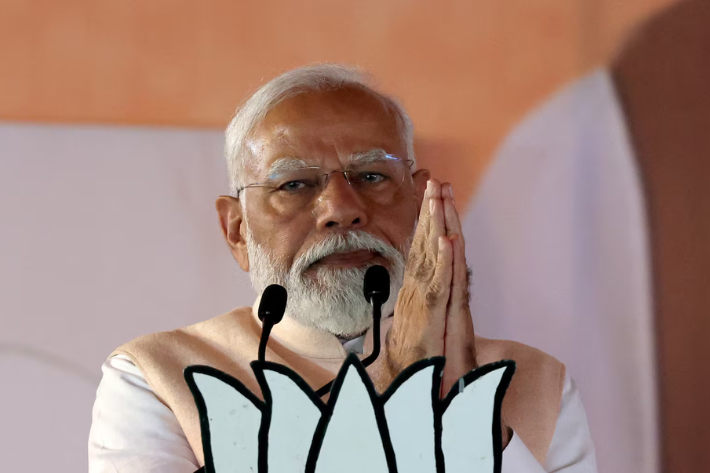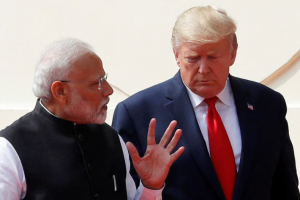Elections in India, the world’s largest democracy and Asia’s third-biggest economy, are set to reach their conclusion next week.
While until a few months ago the incumbent Prime Minister Narendra Modi seemed to be on a sure-footing to return for a rare third-term, a changing mood among the country’s 980 million eligible voters has meant that investors are preparing for all possible outcomes.
Modi is still leading most polls as the potential winner of the giant election, but the margin of his victory may be smaller than earlier expected, analysts and informal betting markets are speculating.
Also on AF: China’s Third Chip Fund Gets $47 Billion to Boost Output
That has meant that investors are preparing for at least two eventualities — an absolute majority win for Modi, or one in which his Bharatiya Janata Party (BJP) will need to team up with coalition partners to form the government.
Fund managers say a strong win for Modi could bring a short-term boost to Indian markets, as it would suggest policy continuity and political stability.
Indian equities are already trading at expensive valuations, after having outperformed most major markets in 2023. Local investors have so far ignored warnings on valuations and poured into markets over optimism that India’s economy will continue to outpace its peers.
The benchmark BSE Sensex Index is up more than 4% so far this year, hitting a fresh all-time-high on Monday. Still, a Reuters poll of equity analysts indicated the index could double the gains by the end of the year.
But a lower margin of victory for Modi could lead to short-term volatility, fund managers said.
“The market is looking at continuity, so a coalition government or another party winning is not the expectation,” Mittul Kalawadia, a senior equity fund manager at Mumbai-based ICICI Prudential Mutual Fund, said.
Foreign investors poured a net $20.74 billion into Indian equities last year, the most in emerging markets in Asia. But they have pulled back this year ahead of the election.
The case of an opposition win
Despite wider expectations of Modi’s win, however, there is some probability that recent resistance from a resurgent opposition, led by the Indian National Congress, the Aam Aadmi Party and a host of regional parties could affect the outcome.
While a sense of apathy and a sweltering heatwave have weighed on voter turnout, some key issues have also led to a swing to the opposition.
Some of those factors include widespread unemployment in states forming the BJP’s key vote banks, rising inflation, and increasing divisiveness against the minority Muslim community.
Fund managers say a win for the opposition could lead to a sharper correction in Indian markets due to policy uncertainty.
ICICI Prudential’s Kalawadia said such a scenario could lead to “a knee-jerk reaction”.
Policy continuity
Fund managers say a third term for a Modi-led government will allow for continuity of policies, including improved fiscal management and keeping the currency stable.
“In the last couple of years, India had a good amount of stability in terms of the current account gap and fiscal discipline, and inflation has been in check,” said Ashish Gupta, chief investment officer at Mumbai-based Axis Mutual Fund, who expects the focus on macroeconomic stability to continue.
“This has led to, both on debt as well as equity side, India’s risk premium coming down,” Gupta said.
Investors also expect the Modi government to continue focusing on turning the country into a manufacturing hub.
Modi’s government has courted foreign companies, including Apple and Tesla, to set up in India as they diversify their supply chains beyond China.
A clear electoral mandate and a government perceived as pro-business and investor-friendly will likely attract foreign investment inflows, said Vivek Bhutoria, co-portfolio manager at Federated Hermes’ global emerging markets equity fund, based in London.
S&P Global noted in analysis on Monday that a third-term for Modi would “very likely continue efforts to position India as the leading representative for the “Global South” and to continue progress toward attaining “developed country” status, aiming to become a US$30 trillion economy by 2047.”
Tax stability
The election campaign has also seen the largest opposition party, the Congress, hint at policies aimed at addressing income inequalities in India. But investors remain wary of such moves.
“We would like the BJP to stay away (from) over-reliance on welfare schemes,” Gary Tan, a portfolio manager at Allspring Global investments in Singapore, said.
Overdependence on such schemes can stress public finances and disrupt India’s macro stability narrative, Tan said.
Local media reports have also suggested the government may consider changes in capital gains tax, which the current administration has denied.
Nilesh Shah, chief executive officer of Kotak Mahindra Asset Management, said he did not expect the government to go down that route and instead introduce policies to deepen capital markets.
Sectors in focus
With the current government focused on spending on infrastructure and pushing manufacturing, fund managers are leaning towards sectors that benefit from these policies.
“We are constructive on beneficiaries from India’s focus on manufacturing such as capital goods firms, automotives and metals,” Sanjay Bembalkar, co-head of equities at Mumbai-based Union Asset Management Company, said.
According to S&P Global, policy focus will remain on strategic sectors, including renewable energy, automotive, electronics, textiles, digital infrastructure, logistics, food production and services, regardless of the election outcome.
- Reuters, with additional inputs from Vishakha Saxena























